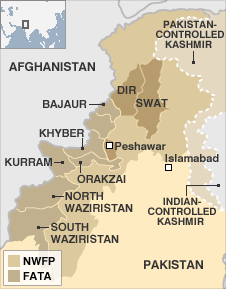Winter has arrived and for the hundreds of thousands of Bajauri residents who have spent much or all of the past two years in refugee camps waiting in the wake of military offensives, stockpiling food has been all but impossible.
 Large portions of the population of the tiniest of Pakistan’s Federally Administered Tribal Areas now depend in whole or in part on food aid centers located across the towns and villages of the agency. Only thing is, those centers are closing.
Large portions of the population of the tiniest of Pakistan’s Federally Administered Tribal Areas now depend in whole or in part on food aid centers located across the towns and villages of the agency. Only thing is, those centers are closing.
A major bombing attack yesterday hit one of the aid centers, when a burqa-clad woman started throwing hand grenades and detonated a suicide belt in line at one of the centers, killing 45 and wounding over 100 others. Since the attack, several other aid centers have closed, fearing they could be next.
The World Food Program aid centers in the region have closed, as have some other tribal centers. The WFP insists they will reopen them “at the earliest possible opportunity,” but have no indication when that will be. For constantly besieged Bajaur, any closure is tough to stomach, and the prospect of a near term improvement in security seems unlikely.


